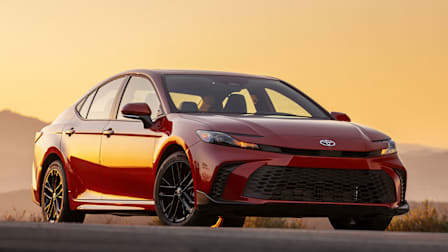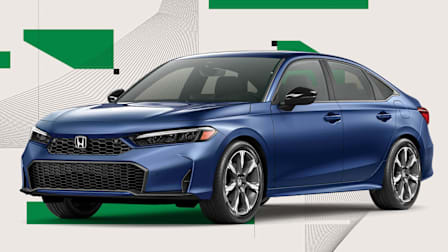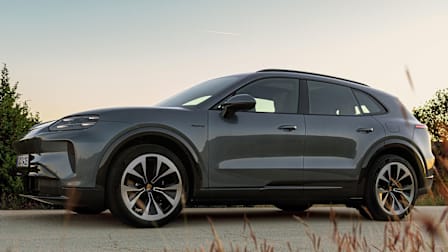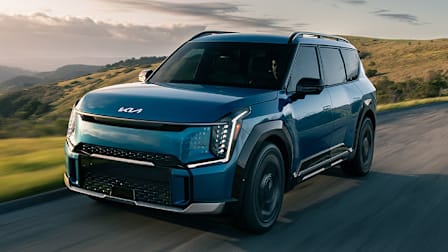Are Hybrids a Smart Choice Right Now?
CR's experts explain why fuel-efficient hybrids are good for many drivers and list the best of the hybrid cars and SUVs
In 2008 I bought my first hybrid—a used Toyota Prius. I drove more than 400 miles a week for my job, so I welcomed its 43 mpg overall fuel economy. I also loved its geeky charm and rock-solid reliability, so much so that I bought another, and then another.
Still, I have to admit that my Prius had a lot of drawbacks common to early hybrids. It took forever to accelerate onto the highway, cost thousands more than a comparable Corolla, and was too small for a big family.
Since those early days, hybrid technology has improved quite a bit. As an autos reporter at CR, I can assure you that many of the latest hybrid cars, trucks, and SUVs are more budget-friendly, versatile, and fun to drive than their gas-only counterparts, let alone my poky old Prius. Hybrids also offer lower emissions than a gas-only car and without the charging hassles of a pure EV. In some cases, they might even save you money over going fully electric. Sound intriguing? With our expertise, we’ll help you determine whether a hybrid is right for you and share some models we really like.
How Hybrid Vehicles Work
Hybrids combine a battery pack, an electric motor that drives the car at low speeds, and a gas engine that kicks in for higher speeds, climbing hills, or recharging the battery. Regenerative braking uses the car’s momentum as it slows down or coasts to create extra electricity. “Hybrids are so fuel-efficient because they utilize energy that would otherwise be wasted,” says Jake Fisher, senior director of CR’s Auto Test Center.
Hybrid Vehicle Benefits
Higher mpg: Most hybrid SUVs get more than 35 mpg and most hybrid sedans get more than 45 mpg. That’s about a 40 percent improvement over nonhybrids, on average.
Easy to use: Unlike a pure electric vehicle, you don’t have to plug in a hybrid. Simply refuel at any gas station.
Better to drive: CR’s tests show that the hybrid versions of many cars have more power and smoother acceleration than the gas-only models.
The Hybrid Vehicle Affordability Factor
Hybrid technology has generally meant comparatively higher sticker prices, though fuel savings can defray costs over time. Today’s average hybrid costs about $1,700 more, but the Ford Maverick pickup and Lexus NX SUV hybrids actually have lower sticker prices than gas-only versions. The new Lexus RX Hybrid costs the same as a comparably equipped nonhybrid.
In 2015 CR calculated that most hybrids took eight years to pay for themselves through fuel savings, with some, including the 2015 Volkswagen Jetta Hybrid and Lexus RX450h, taking more than a decade. Today, improved technology means that most hybrids have a payback period of four years or less, with gas at $3.14 a gallon and 12,000 miles driven a year. The more miles driven, the quicker the payback.
You may also save money on repairs and maintenance. Case in point: The Prius is often in the top spot in our reliability surveys. A hybrid’s regenerative brakes create less wear and tear, so braking components can last longer, too. It’s true that replacing a hybrid battery can be a big expense, costing, on average, around $7,400, according to RepairPal, but our surveys show such replacements are rare. “Hybrid technology has been very reliable in our studies,” Fisher says.
In surveys, hybrid owners tell us that they’d buy their same car again, and 83 percent of the hybrids we’ve tested are recommended by CR compared with 57 percent for all tested models.
What About a Plug-In Hybrid Electric Vehicle?
Pure hybrids don’t need to be plugged in. But there are a few plug-in hybrid electric vehicles (PHEVs) that can be charged to run on mostly electric power for around 25 to 50 miles before the gas engine takes over. Examples include the BMW X5 xDrive45e, Ford Escape PHEV, Hyundai Tucson PHEV, and Toyota RAV4 Plug-In Hybrid. They can be charged at a regular household outlet, and some qualify for federal tax credits, unlike regular hybrids.
They’re ideal for drivers who take short trips and can do most of their driving on electricity, reserving the gas engine for longer trips. PHEV owners who charge every day save money because they can avoid using the gas engine. But a PHEV doesn’t make sense for long commutes.
“If you don’t plug it in, you’re better off buying a regular hybrid, which will usually cost less up front and get slightly better gas mileage than a PHEV after its electric range is depleted,” Harto says. If you’d like to learn more, check out our guide to the best PHEVs available.
The Many Sizes of Hybrid Vehicles
Those in the market for a larger vehicle will see the most savings with a hybrid. Big SUVs, pickups, and minivans tend to get the worst fuel economy among all gas-powered vehicles, so efficiency improvements can become more meaningful. “Going from 20 mpg to 25 mpg saves a lot more fuel than going from 30 mpg to 35 mpg,” Fisher says.
And there are some great options out there, such as the Toyota Sienna minivan, which seats eight people and registers 36 mpg overall.
CR’s Top-Rated Hybrid Vehicles
From SUVs to pickup trucks, these are the best hybrids in every vehicle class that will also save you the most money. They’re recommended by CR and have at least average predicted reliability.





